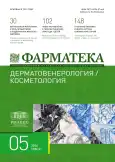Review of innovative methods of therapy for psoriasis
- Authors: Shulepov V.V.1, Novikov Y.A.1, Pravdina O.V.1
-
Affiliations:
- Omsk State Medical University
- Issue: Vol 31, No 5 (2024)
- Pages: 108-114
- Section: New drugs and treatment approaches
- URL: https://journal-vniispk.ru/2073-4034/article/view/267808
- DOI: https://doi.org/10.18565/pharmateca.2024.5.108-114
- ID: 267808
Cite item
Abstract
This article discusses innovative methods of treating psoriasis, such as 2nd generation Janus kinase (JAK) inhibitors (deucravacitinib), a hydrogel (BVn) based on self-assembling bilirubin nanoparticles and an inhibitor of the amino acid transporter ASCT2 (V9302), a microneedle patch based on hyaluronic acid and two-dimensional inorganic compounds (maxenes), used to introduce monoclonal antibodies (MAbs) directly into the psoriatic lesion, NLRP3 inflammasome inhibitors.
When analyzing modern studies devoted to the evaluation of promising methods for treating psoriasis, two main trends were noted: further research into drugs based on small molecules and the development of new MAbs for more effective and affordable treatment of psoriasis. In addition, current treatment strategies are aimed at relieving symptoms, improving quality of life, and preventing the progression of psoriasis. However, existing methods are limited by side effects, treatment resistance and high costs. These limitations highlight the urgency of searching for new innovative treatment methods.
The uniqueness of this work lies in the fact that it most fully presents the above methods of therapy, and when searching for modern works for analysis, Russian-language articles mainly described new genetically engineered biological drugs (GEBPs), such as interferons, interleukins and Mabs, were used.
Full Text
##article.viewOnOriginalSite##About the authors
V. V. Shulepov
Omsk State Medical University
Author for correspondence.
Email: shulepov72@icloud.com
ORCID iD: 0009-0005-1984-2309
VI-year Student of the Faculty of Medicine
Russian Federation, OmskYu. A. Novikov
Omsk State Medical University
Email: shulepov72@icloud.com
ORCID iD: 0000-0003-0391-5372
Russian Federation, Omsk
O. V. Pravdina
Omsk State Medical University
Email: shulepov72@icloud.com
ORCID iD: 0000-0002-1804-6248
Russian Federation, Omsk
References
- Клинические рекомендации. Псориаз. 2023. Министерство здравоохранения Российской Федерации. [Clinical guidelines. Psoriasis. 2023. Ministry of Health of the Russian Federation. (In Russ.)]. URL: https://cr.minzdrav.gov.ru/recomend/234_2.
- Griffiths C.E.M., van der Walt J.M., Ashcroft D.M., et al. The global state of psoriasis disease epidemiology: a workshop report. 2017. doi: 10.1111/bjd.15610.
- Zarrin, A.A., Bao, K., Lupardus, P., et al. Kinase inhibition in autoimmunity and inflammation. Nature Reviews Drug Discovery. 2021;20(1):39–63. doi: 10.1038/s41573-020-0082-8.
- Roskoski Jr R. Deucravacitinb is an allosteric TYK2 protein kinase inhibitor FDA-approved for the treatment of psoriasis. Pharmacol Res. 2023;189:106642. doi: 10.1016/j.phrs.2022.106642.
- Wrobleski S.T., Moslin R., Lin S., et al. Highly selective inhibition of tyrosine kinase 2 (TYK2) for the treatment of autoimmune diseases: discovery of the allosteric inhibitor BMS-986165. J Med Chem. 2019;62(20):8973–8995. doi: 10.1021/acs.jmedchem.9b00444.
- Mullard A. First de novo deuterated drug poised for approval. Nat Rev. Drug Discov. 2022; 21(9):623–25. doi: 10.1038/d41573-02200139-6.
- Madison A., Luo Y., Raimondi G., et al. Jakinibs of all trades: inhibiting cytokine signaling in immune-mediated pathologies. Pharmaceuticals. 2021;15(1):48. Doi: 10.3390/ ph15010048.
- Catlett I.M., Aras U., Hansen L., et al. First‐in-human study of deucravacitinib: A selective, potent, allosteric small‐molecule inhibitor of tyrosine kinase 2. Clin Transl Sci. 2023;16(1):151–64. doi: 10.1111/cts.13435.
- Xinhui N., Lai Y. Keratinocyte: A trigger or an executor of psoriasis? J Leukoc Biol. 2020;108(2):485–91. doi: 10.1002/JLB.5MR0120-439R.
- Jiang X., Huang S., Cai W., et al. Glutamine‐Based Metabolism Normalization and Oxidative Stress Alleviation by Self-Assembled Bilirubin/V9302 Nanoparticles for Psoriasis Treatment. Adv Healthc Mater. 2023;12(13):2203397. doi: 10.1002/adhm.202203397.
- Jiang X., Yao Q., Xia X., et al. Self-assembled nanoparticles with bilirubin/JPH203 alleviate imiquimod-induced psoriasis by reducing oxidative stress and suppressing Th17 expansion. Chemical Engineering Journal. 2022;431:133956. Doi: 10.101i6/j.cej.2021.133956.
- Keum H., Kim T.W., Kim Y., et al. Bilirubin nanomedicine alleviates psoriatic skin inflammation by reducing oxidative stress and suppressing pathogenic signaling. J Control Release. 2020;325:359–69. doi: 10.1016/j.jconrel.2020.07.015.
- Wang W., et al. Astilbin reduces ROS accumulation and VEGF expression through Nrf2 in psoriasis-like skin disease. Biol Res. 2019;52(1):49. doi: 10.1186/s40659-019-0255-2.
- Scalise M., Pochini L., Console L., et al. The human SLC1A5 (ASCT2) amino acid transporter: from function to structure and role in cell biology. Front Cell Dev Biol. 2018;6:96. doi: 10.3389/fcell.2018.00096.
- Bullock J.L., Gillette D.D., Smith J.A. Small molecule, nanoparticle and liposomal strategies for LAT1-mediated chemotherapy delivery. Results Chem. 2023;6:101056. doi: 10.1016/j.rechem.2023.101056.
- Patel A.B., Tsilioni I., Weng Z., et al. TNF stimulates IL-6, CXCL 8 and VEGF secretion from human keratinocytes via activation of mTOR, inhibited by tetramethoxyluteolin. Exp Dermatol. 2018;27(2):135–43. doi: 10.1111/exd.13461.
- Sun L., Liu Z., Wang L., et al. Enhanced topical penetration, system exposure and anti-psoriasis activity of two particle-sized, curcumin-loaded PLGA nanoparticles in hydrogel. J Control Release. 2017;254:44–54. doi: 10.1016/j.jconrel.2017.03.385.
- Bigliardi P.L. Role of skin pH in psoriasis. Curr Probl Dermatol. 2018;54:108–14. doi: 10.1159/000489524.
- Orsmond A., Bereza-Malcolm L., Lynch T., et al. Skin barrier dysregulation in psoriasis. Int J Molecular Sci. 2021;22(19):10841. doi: 10.3390/ijms221910841.
- Wu D., Shou X., Yu Y., et al. Biologics‐Loaded Photothermally Dissolvable Hyaluronic Acid Microneedle Patch for Psoriasis Treatment. Adv Functional Mater. 2022;32(47):2205847. doi: 10.1002/adfm.202205847.
- Iravani S., Varma R. S. MXenes in photomedicine: Advances and prospects. Chem Commun (Camb). 2022;58(53):7336–7350. doi: 10.1039/D2CC01694J.
- Li H., Fan R., Zou B., et al. Roles of MXenes in biomedical applications: recent developments and prospects. J Nanobiotechnol. 2023;21(1):1–39. doi: 10.1186/s12951-023-01809-2.
- Jiang L., Zhou D., Yang J., et al. 2D single-and few-layered MXenes: synthesis, applications and perspectives. J Mater Chem A. 2022;10(26):13651–72. doi: 10.1039/D2TA01572B.
- Dai Y., Zhou J., Shi C. Inflammasome: structure, biological functions, and therapeutic targets. Med Comm. 2023;4(5):e391. doi: 10.1002/mco2.391.
Supplementary files













